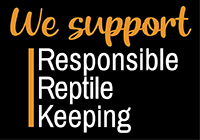All Water Is Not Equal — The Art of Watering Your Pet Reptile and Water Features

All Water Is Not Equal — The Art of Watering Your Pet Reptile
Written by Mariah Healey, ReptiFiles.com
For being a clear, odorless, tasteless liquid, there sure are a lot of different kinds of water! Water is a big part of keeping reptiles and amphibians as pets, especially when you’re running a bioactive setup. The type of water that you choose to use can potentially make a big difference in your animal husbandry. So today we’re going to investigate: What type of water is best to use with reptiles and amphibians?
Tap Water
Tap water is pretty self-explanatory: it’s the water that flows out of the faucets in your home and comes from your city’s water supply. Depending on your area, it might be hard (contains lots of calcium and magnesium), or it might be soft (relatively free of dissolved minerals). Depending on the quality of your local water treatment, it might be quite safe for human consumption, borderline undrinkable, or somewhere in-between.
Pros: cheap, convenient, doesn’t come in bottles, may contain beneficial minerals
Cons: lots of variation in quality; chlorine, chloramines, and other contaminants; likely to leave water spots, contributes to calcium buildup in soil
Tap water is great for washing enclosure décor and accessories, and can usually be used to fill water bowls. It’s is generally safe to use for reptiles, although if you want to use it for amphibians, it’s best practice to use a high-quality water conditioner to eliminate the chlorine and chloramines if you’re using it for misting, fogging, or drinking.
Softened Water
Softened water is tap water that has been processed by water softening equipment. Water softeners use sodium or potassium to remove calcium and magnesium from the water. Many homes have built-in water softeners to treat their entire water supply.
Pros: reduces water spots, reduces mineral buildup in foggers/automatic misting systems
Cons: low in beneficial minerals; high in sodium, which may be detrimental to plant and animal health
Softened water is fine to use for washing enclosure décor and accessories, but it shouldn’t be used for drinking, and is likely not to be appropriate for fogging or misting.
Spring Water
Spring water is water that has been collected from a natural spring. This type of water is considered “pre-purified” since is has been naturally filtered through materials like limestone, sandstone, and clay. It is likely to be artificially filtered after collection to remove contaminants. Spring water is not the same as tap water, which is sometimes called “purified water.”
Pros: high in beneficial minerals, consistent standard of quality
Cons: sold in bottles (not very eco-friendly), likely to leave mineral deposits/water spots
It’s best to use the spring water that is sold in bottles, rather than spring water that may run through your tap, as the bottled stuff is more consistent in quality. This type of spring water is generally safe to use for reptiles and amphibians to drink without being treated for chlorine or chloramines. It can also be used for watering plants, misting, and fogging.
Reverse-Osmosis Water
Reverse-osmosis water (also known as “RO” water or “filtered” water) is usually tap water that has been processed through a filter or series of filters to remove salts, minerals, heavy metals, chlorine, and other contaminants. It’s considered to be 99% pure.
Pros: no water spots/mineral buildup, helps keep foggers/misters free of pathogens, can be “made” at home with fairly inexpensive equipment, fairly effective at removing chloramines
Cons: beneficial minerals absent, doesn’t kill pathogens, filtering process is fairly wasteful
RO water is safe to use for reptiles and amphibians to drink without being treated for chlorine or chloramines. It can also be used for watering plants, misting, and fogging.
Although the absence of minerals is cause for concern, as long as your pet is getting mineral supplementation as a consistent part of its diet, mineral deficiency is unlikely to be a significant problem. For best results, use a mineral supplement that includes magnesium.
Distilled Water
Distilled water is water that has been boiled, with the steam collected and condensed to remove impurities such as salts, minerals, heavy metals, etc. If an activated carbon filter is added to the unit, chlorine is also removed. This results in 99.9% pure water. The boiling stage of the process also kills pathogens.
Pros: no water spots/mineral buildup, helps keep foggers and automatic misting systems free of pathogens, can be “made” from home tap water with the right equipment, efficient filtering process
Cons: beneficial minerals absent, impurities with a lower boiling point than water not removed, less effective at removing chloramines, distilling equipment is more expensive, requires electricity to “make”
RO water is safe to use for reptiles and amphibians to drink, although it’s best practice to treat it with water conditioner as a precaution for amphibians. It can also be used for watering plants, misting, and fogging.
Although the absence of minerals is cause for concern, as long as your pet is getting mineral supplementation as a consistent part of its diet, mineral deficiency is unlikely to be a significant problem. For best results, use a mineral supplement that includes magnesium.
Conclusion
Each type of water has its pros and cons. Consider your needs specific to your pet and the type of water you have available, and make the decision that is best for you and your situation.
- Josh Halter










